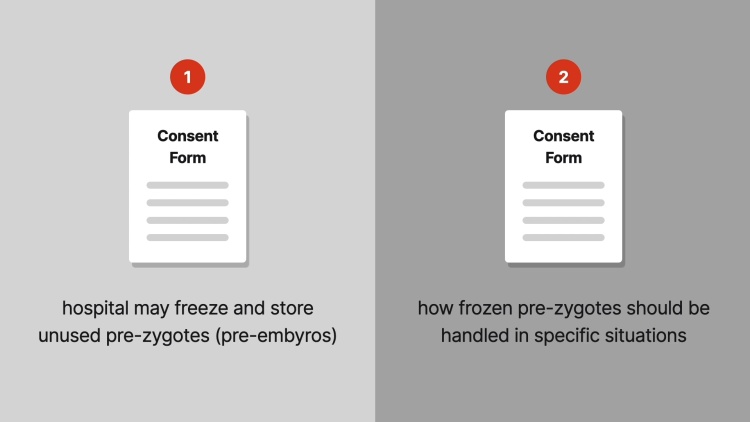Kass v. Kass
New York Court of Appeals
91 N.Y.2d 554, 696 N.E.2d 174, 673 N.Y.S.2d 350 (1998)
- Written by Craig Conway, LLM
Facts
Almost immediately after getting married, Maureen Kass (plaintiff) and Steven Kass (defendant) began trying to conceive a child. After several unsuccessful attempts to do so, the couple enrolled in a hospital’s in vitro fertilization (IVF) program. As a result of the IVF program, Maureen became pregnant twice, each failing to result in a successful birth. Just prior to the final procedure, the couple signed several consent forms which provided the risks and benefits of the procedure as well as required Maureen and Steven to express their desire related to disposition of excess fertilized eggs, or “pre-zygotes,” that were to be frozen. After a final unsuccessful attempt to become pregnant, the couple decided to divorce. In the uncontested divorce agreement, the couple agreed that neither party would lay claim to the five frozen pre-zygotes. Instead, they agreed that the pre-zygotes would be used for research by the hospital. However, Maureen later changed her mind and sought custody of the pre-zygotes so that she could undergo another implantation procedure. Steven objected that he did not want to be the genetic father and counterclaimed for specific performance of the parties’ agreement to allow the hospital to retain the pre-zygotes for research as specified in their signed consent forms. All issues related to the divorce were finalized except for disposition of the pre-zygotes. The trial court granted custody of the pre-zygotes to Maureen with approval to implant them within a medically reasonable time. The appellate division reversed and held that the couples’ consent document was controlling. Maureen appealed.
Rule of Law
Issue
Holding and Reasoning (Kaye, C.J.)
What to do next…
Here's why 911,000 law students have relied on our case briefs:
- Written by law professors and practitioners, not other law students. 47,100 briefs, keyed to 997 casebooks. Top-notch customer support.
- The right amount of information, includes the facts, issues, rule of law, holding and reasoning, and any concurrences and dissents.
- Access in your classes, works on your mobile and tablet. Massive library of related video lessons and high quality multiple-choice questions.
- Easy to use, uniform format for every case brief. Written in plain English, not in legalese. Our briefs summarize and simplify; they don’t just repeat the court’s language.





